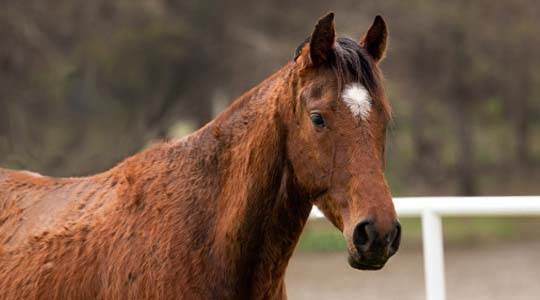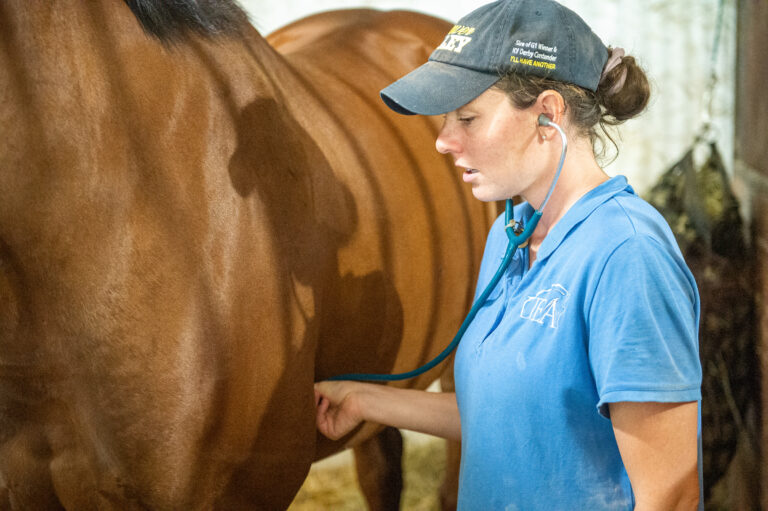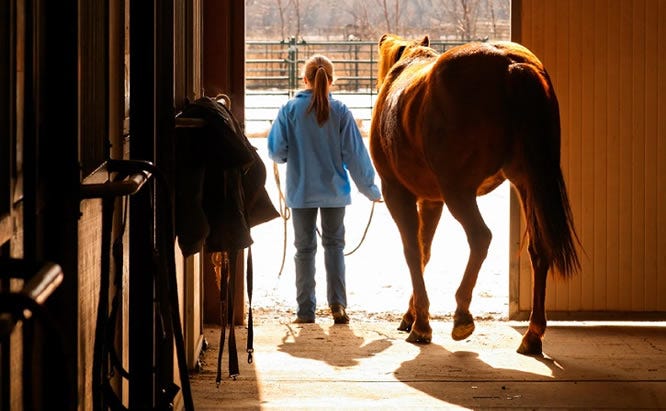As horses age, their needs change, and exercise for senior horses becomes increasingly important. This not only helps maintain their physical health but also boosts their mental well-being. Understanding the unique requirements of older horses ensures they remain active and happy in their golden years.

Why Exercise is Vital for Senior Horses
Exercise for senior horses is crucial as it helps in maintaining muscle tone, joint flexibility, and cardiovascular health. Regular activity can also prevent obesity and related health issues. Senior horses, much like humans, benefit from keeping their bodies moving, which can slow down the aging process and enhance their quality of life.
Moreover, regular exercise serves as a mental stimulant. It provides older horses with the necessary engagement to keep their minds sharp and spirits high. For more tips on ensuring overall health, visit our digestive support guide.
Understanding the Physical Limitations
Senior horses may face certain physical limitations that must be considered when planning their exercise routines. Issues like arthritis, reduced stamina, and dental problems can affect how they perform during physical activities. It’s important to tailor exercise programs to cater to these limitations.
Common Health Concerns
Some common health concerns in senior horses include joint stiffness and decreased lung capacity. Regular check-ups with a veterinarian are essential to monitor these issues and adjust exercise plans accordingly. Learn more about managing health issues such as Cushings disease in older horses.
Designing an Exercise Program
When designing an exercise program for senior horses, it’s important to incorporate activities that are both engaging and appropriate for their age. Begin with light, low-impact exercises and gradually increase the intensity as the horse builds stamina.
Types of Exercises
- Walking: A simple yet effective way to maintain mobility and fitness.
- Light Trot: Helps with cardiovascular health and muscle tone.
- Stretching Exercises: Enhance flexibility and reduce stiffness.
Always monitor the horse’s response to these exercises and adjust the routine to avoid overexertion.
Incorporating Rest and Recovery
Rest is as important as exercise for senior horses. It allows their bodies to recover and prevents exhaustion. Ensure that your horse has ample time to rest between exercise sessions. A balanced exercise-rest schedule is vital for maintaining health and energy levels.
Signs of Overexertion
Watch out for signs of overexertion, such as excessive sweating, rapid breathing, or unwillingness to continue exercising. If these occur, allow your horse to rest and consult a veterinarian if needed.
Feeding and Nutrition
Nutrition plays a key role in supporting exercise for senior horses. A balanced diet helps maintain energy levels and supports muscle health. For advice on proper nutrition, explore our hay requirements for senior horses.
Supplements for Senior Horses
Consider adding supplements to your senior horses diet to support joint health and overall well-being. Our detailed guide on aging horse supplements offers valuable insights.
Hydration is Key
Keeping senior horses hydrated is crucial, especially during exercise. Dehydration can lead to serious health issues, so always ensure your horse has access to clean, fresh water. For more on hydration, read our hydration tips.
Ensuring Safety During Exercise
Safety should always be a priority when exercising senior horses. Make sure the exercise environment is safe and free of hazards. Furthermore, always use appropriate gear to protect your horse from injuries.
The Role of Supervision
Supervision during exercise is essential to ensure that the horse does not injure itself. Being present allows you to make immediate adjustments if necessary and provides reassurance to your horse.
Adapting to Seasonal Changes
Seasonal changes can impact how you exercise senior horses. During colder months, ensure that your horse is properly warmed up before exercise to prevent muscle stiffness. In warmer months, exercise during cooler parts of the day to avoid overheating.
Benefits of Regular Exercise
Regular exercise for senior horses offers numerous benefits, including improved joint flexibility, better digestion, and enhanced mood. It also fosters a strong bond between the horse and its owner, contributing to a fulfilling relationship.
Mental Health Benefits
Beyond physical health, exercise is crucial for mental stimulation. It can alleviate boredom and reduce anxiety, contributing to a happier, more content horse.
Conclusion
Caring for senior horses requires dedication and understanding of their unique needs. By prioritizing exercise, nutrition, and safety, you can help your horse enjoy a vibrant and healthy life well into its senior years. For more extensive tips on caring for older horses, visit 10 Tips for Caring for the Older Horse.

FAQs
How often should senior horses exercise?
Senior horses should exercise regularly, ideally daily, but the intensity and duration should be adjusted based on their health status and energy levels.
What are the best exercises for senior horses?
Low-impact activities like walking and light trotting are best. Stretching exercises also help maintain flexibility.
How can I tell if my senior horse is overexerted?
Signs of overexertion include excessive sweating, rapid breathing, or reluctance to continue. It’s important to stop and allow rest if these occur.
This article contains affiliate links. We may earn a commission at no extra cost to you.
